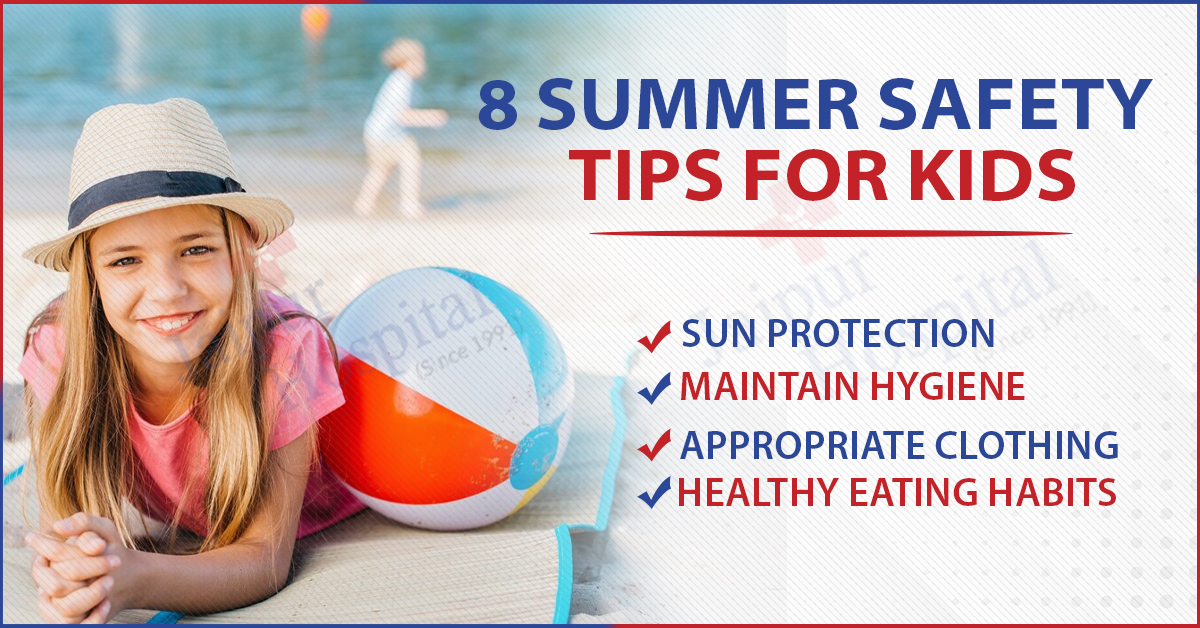Summer is a time of adventure and fun for kids, with long days spent swimming, biking, and exploring the outdoors. However, it’s also a season that requires special attention to safety to ensure these activities remain enjoyable and hazard-free. Summer safety tips for kids encompasses a range of precautions, from sun protection and hydration to water safety and awareness of potential outdoor hazards like insects and plants. Parents and caregivers can help prevent common summer injuries and illnesses by staying informed and prepared, creating a safe and happy environment for children to enjoy all the season offers.
Summer Safety Tips for Kids
Here are eight essential summer safety tips for kids, detailed to ensure a fun and safe season:
1.Sun Protection
- Use Sunscreen: Apply a broad-spectrum sunscreen with at least SPF 30 on your child’s exposed skin. Reapply every two hours, especially after swimming or sweating. Don’t forget areas like the ears, nose, and back of the neck.
- Wear Protective Clothing: Dress children in long-sleeved shirts, wide-brimmed hats, and sunglasses with UV protection to shield their skin and eyes from harmful rays.
- Seek Shade: Encourage kids to play in shaded areas during peak sun hours (10 AM to 4 PM) to minimize UV exposure. Utilize umbrellas, canopies, or natural shade when available.
2.Maintain Hygiene
- Regular Hand Washing: Ensure kids wash their hands frequently with soap and water, particularly before eating, after using the bathroom, and after playing outside. Hand sanitizer with at least 60% alcohol can be used when soap and water aren’t available.
- Bathing: Daily showers help remove sweat, dirt, and potential allergens, preventing skin irritations and infections. Make bath time a relaxing routine to keep kids clean and refreshed.
3.Appropriate Clothing
- Light and Breathable Fabrics: Dress children in light-colored, loose-fitting clothes made from breathable materials like cotton to keep them cool and comfortable. Avoid synthetic fabrics that can trap heat.
- Footwear: Choose proper shoes, such as sneakers or sandals with good grip, to prevent injuries. Flip-flops are fine for short durations but don’t provide adequate support for extended play or rough terrain.
4.Hydration and Heat Exhaustion
- Stay Hydrated: Ensure kids drink plenty of water throughout the day. Encourage them to drink even if they don’t feel thirsty. Infuse water with fruits or offer popsicles made from 100% fruit juice to make hydration fun.
- Recognize Heat Exhaustion: Watch for symptoms of heat exhaustion, such as heavy sweating, weakness, dizziness, nausea, or headaches. If any of these symptoms appear, move the child to a cooler place, remove excess clothing, and hydrate them immediately. Offer cool, damp cloths or a fan to help lower their body temperature.
5.Healthy Eating Habits
- Nutritious Snacks: Provide fresh fruits, vegetables, whole grains, and other healthy snacks to keep energy levels up. Avoid excessive sugary snacks and drinks that can lead to dehydration and energy crashes.
- Regular Meals: Maintain a balanced diet with regular meal times. Include a variety of foods to ensure kids get the necessary nutrients for their growth and energy needs. Incorporate hydrating foods like watermelon, cucumber, and oranges into meals.
6.Water Safety
- Supervision: Always supervise children near ponds, rivers, lakes, and pools, regardless of their swimming abilities. Stay within arm’s reach of young children and make sure older kids swim with a buddy.
- Swimming Skills: Enroll kids in swimming lessons to build their skills and confidence in the water. Teach them water safety rules, such as no running near pools and never swimming alone.
- Life Jackets: Use life jackets for young children and inexperienced swimmers when near open water. Ensure the life jacket fits properly and is appropriate for the child’s weight and swimming ability.
7.Awareness of Summer Bugs
- Insect Repellent: Apply insect repellent containing DEET, picaridin, or oil of lemon eucalyptus to protect against mosquitoes, ticks, and other bugs. Avoid applying repellent to children’s hands, eyes, or mouth.
- Check for Ticks: Regularly check kids for ticks, especially after they have been in wooded or grassy areas. Pay close attention to areas like behind the ears, around the waist, and under the arms. Remove ticks promptly with fine-tipped tweezers.
- Avoid Standing Water: Empty containers that collect standing water, such as flowerpots, buckets, and birdbaths, to prevent mosquito breeding. Ensure that window and door screens are intact to keep bugs out of the house.
Also Read:- 8 Benefits of Walking on a Daily Basis
8.Moderate Outdoor Activities
- Avoid Overexertion: Encourage frequent breaks and avoid excessive physical activities during the hottest parts of the day. Plan outdoor play for the early morning or late afternoon when temperatures are cooler.
- Cool Down: Provide opportunities to cool down with water play, such as sprinklers, water balloons, or trips to the pool. Indoor activities with air conditioning or fans can also help kids stay cool during extreme heat.
Conclusion
Ensuring a safe and enjoyable summer for your kids involves a combination of preparation, education, and vigilance. By following these essential summer safety tips, you can help protect your children from common summer hazards while allowing them to have fun and create lasting memories. Jaipur Hospital encourages all parents and guardians to prioritize these safety measures to ensure a happy, healthy summer for their family. Remember, the key to a safe summer is proactive prevention and constant supervision. Keep these tips in mind, and you’ll be well on your way to a wonderful and worry-free summer.


